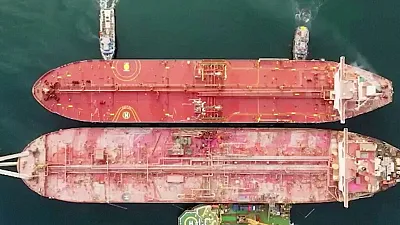Let's create continuous conversations about climate change education: Spreading the Sediment of Science!
Share your ideas and earn a $20 gift card! 💬 Learn More
UN Undertakes Risky Mission on Abandoned Oil Tanker in Red Sea
August 1, 2023

Crews from the United Nations (UN) have launched an operation to remove more than 1 million tons of oil from a decaying tanker in the Red Sea off Yemen’s coast. They hope to avoid an environmental disaster.
The complex, 19-day mission began last week after the UN finally gained enough political and financial support to begin the work. The UN has warned for years that the rusting vessel could leak or explode. That would cause a massive oil spill. Such a disaster could cost up to $20 billion to clean up, the UN said.
The civil war in Yemen stopped maintenance work on the ship in 2015. The war is still going on. The ship has been left to sit unattended with a major load aboard. The vessel has been anchored about five miles off Yemen’s coast for 30 years.
Experts warned that a spill from the tanker could reach the African coast. That would disrupt key sea channels, a UN spokesperson said. Such a spill also could kill fish for the next 25 years and cost 200,000 jobs. It would also close ports in Yemen. The aid that assists 17 million Yemeni people with basic needs arrives through those ports.
The operation itself is risky. That's because the broken-down tanker is in bad shape. Air support is on standby to release chemicals that experts hope would break up the oil if a spill happens.
The US has given $10 million to the mission. But the UN is still seeking another $22 million to complete it. The UN has received $121 million for the project so far.
Photo from Reuters.
Reflect: Do you think the mission to remove oil from an abandoned oil tanker should be the responsibility of the United Nations? Explain.





